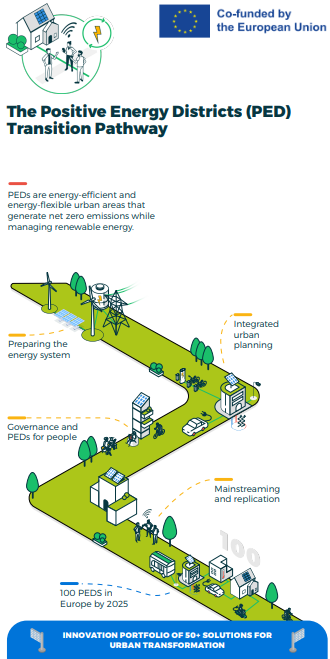
What is DUT? The Driving Urban Transitions (DUT) Partnership is a collaborative research and innovation programme that addresses urban sustainability challenges and aims to develop systems that allow urban actors to become active change makers. The DUT Partnership currently consists of more than 60 organizations from 28 countries and is actively supported by the European Commission. Through research, innovation, and strategic collaboration with urban stakeholders, the DUT Partnership is designed to turn global transition strategies into local action.
The DUT Partnership is firmly committed to the European Green Deal and the UN Sustainable Development Goals, and supports projects across three transition pathways, with the shared purpose of mobilizing urban resources to achieve sustainability goals. The three transition pathways are [1] the ‘Circular Urban Economies’ (CUE) pathway, which aims to make cities more resource efficient, [2] the ‘Positive Energy Districts’ (PED) pathway, which aims to develop energy-efficient and energy-flexible urban areas, and [3] the ’15-minute City’ (15mC) pathway, which seeks to improve urban accessibility through innovative rethinking of urban services. Our new project in the DUT Partnership, COPPER, has been accepted into the PED transition pathway.
We received news of COPPERs approval this July, and the entire consortium, which consists of eight partners from four different countries, is overjoyed that our proposal has been accepted into the DUT Partnership. Our team at SEAS (Svaaheia Eiendom AS) will work alongside the talented people of Radboud University and HAN University in the Netherlands, Aalborg University and EBO Consult in Denmark, University Institute of Lisbon in Portugal, and Ruralis and Eigersund Næring og Havn in Norway. COPPER is co-funded by the European Commission and the Research Council of Norway, and the 36-months long project is expected to start in January of 2024. With a research-oriented approach and active collaboration with local communities in Norway, Denmark, Portugal, and the Netherlands, our goal is to co-produce new knowledge and offer solutions for human-centric development of urban energy systems.
Through the COPPER project we aim to grant citizens greater access to energy information supply, model energy systems for energy market balancing, and improve strategic and integrated spatial energy planning.


